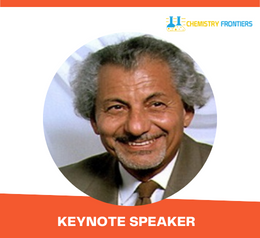Scholars
Frontiers in Chemistry Forum
THEME: "Excellence and Innovation in Chemistry"
 20-21 Jun 2022
20-21 Jun 2022  NH Potsdam, Berlin, Germany & Online
NH Potsdam, Berlin, Germany & Online THEME: "Excellence and Innovation in Chemistry"
 20-21 Jun 2022
20-21 Jun 2022  NH Potsdam, Berlin, Germany & Online
NH Potsdam, Berlin, Germany & Online 
Laval University, Canada
Title: Historical Chemistry: Trans-uranium or Uranium Fission?
Ida Noddack's scientific career centers around her
intensive study of the Periodic Table.
This resulted in two major discoveries.
The first was based on her realization that the missing element
dvi-manganese should have properties similar to its neighbours in the
horizontal period and not to members of the vertical group of which manganese
was the only member known. In this way
she was able to look for and discover the metal rhenium. The second discovery was a daring hypothesis
that the so-called element 93, a transuranium element that was supposedly
formed by bombarding uranium (element 92) by neutrons, and was put under
rhenium in the manganese group (in the old Periodic Table) was not
correct. Instead, she suggested that the
uranium atom might have split into two fragments -- a phenomenon that later
became known as fission.
Fathi Habashi,
Professor Emeritus of Extractive Metallurgy at Laval University in Quebec City.
He holds a B.Sc. degree in Chemical Engineering from the University of Cairo
(1949), a Dr. techn. degree in Inorganic Chemical Technology from the
University of Technology in Vienna (1959), and Dr. Sc. honorus causa from the
Saint Petersburg Mining Institute in Russia (1993) and from the National
Technical University in Lima, Peru (2010). He held the Canadian Government
Scholarship at the Mines Branch in Ottawa (1960–1962), taught at Montana
College of Mineral Science & Technology (1964–1967), then worked at the
Extractive Metallurgical Research Department of Anaconda Company in Tucson,
Arizona before joining Laval in 1970. His research was mainly directed towards
organizing the unit operations in extractive metallurgy and putting them into a
historical perspective.He is an Honorary Professor at the Technical University
of Oruro in Bolivia, Honorary Citizen of the city of Oruro, Governor at the
Fondation de l’Université Laval, and Member of Le Cercle des Ambassadeurs in
Québec City. He is a member of a number of Editorial Boards of extractive
metallurgy journals and Chairman of the Historical Metallurgical Committee of
the Metallurgical Society of the Canadian Institute of Mining, Metallurgy, and
Petroleum. Habashi was guest professor at a number of foreign universities,
authored a number of textbooks on extractive metallurgy and its history, and
edited Handbook of Extractive Metallurgy in 4 volumes in 1997. Some of his
textbooks were translated in many languages. In 1998 he was named a Fellow of
the Canadian Institute of Mining, Metallurgy, and Petroleum and in 1999 he
received its silver medal.